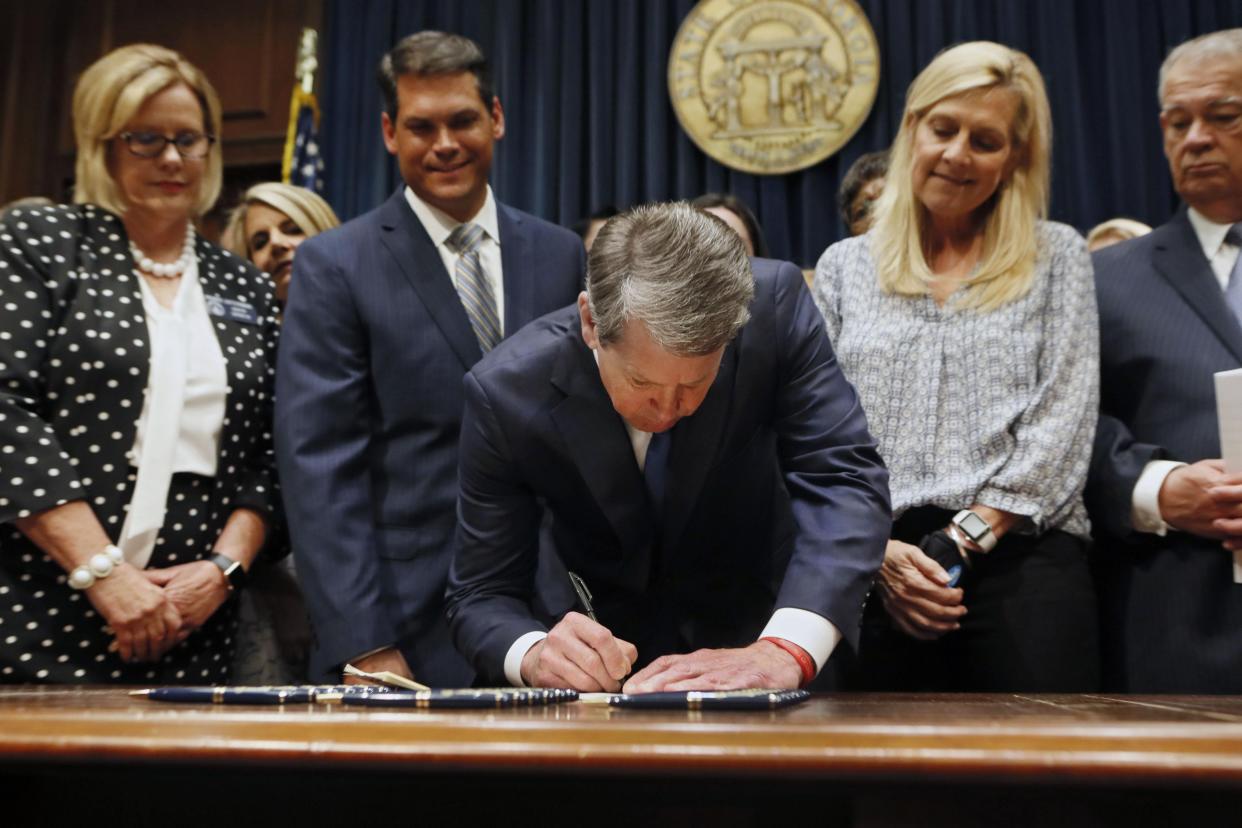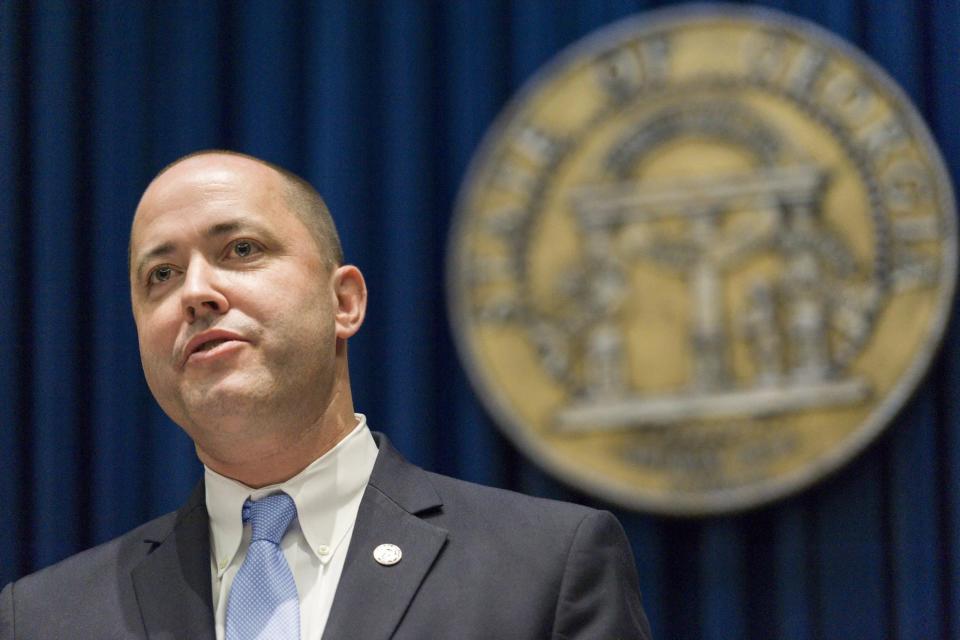Supreme Court Roe v. Wade decision means Georgia's abortion law can take effect quickly

- Oops!Something went wrong.Please try again later.
- Oops!Something went wrong.Please try again later.
- Oops!Something went wrong.Please try again later.
The Supreme Court ruling in Dobbs v. Jackson, released Friday, is likely to change abortion access in Georgia — and Georgia officials are already trying to implement previously unconstitutional laws. The state's attorney general that same day filed a notice to overturn a ruling blocking the implementation of the state's "heartbeat bill."
The final decision was written by Justice Samuel Alito, and, like an earlier leaked draft, overturned nearly 50 years of precedent on abortion access.
"We hold that Roe and Casey must be overruled," Alito wrote. "The Constitution makes no reference to abortion, and no such right is implicitly protected by any constitutional provision, including the one on which the defenders of Roe and Casey now chiefly rely – the Due Process Clause of the Fourteenth Amendment."
Alito was joined by Justices Clarence Thomas, Neil Gorsuch, Brett Kavanaugh, and Amy Coney Barrett. Thomas and Kavanaugh filed concurring opinions, while Chief Justice John Roberts filed an opinion concurring with the judgment. Justices Stephen Breyer, Sonia Sotomayor and Elena Kagan filed a dissenting opinion.
"It's certainly the most consequential day in constitutional law in my lifetime," said Fred Smith, professor of law at Emory University.

What does it mean now that Roe v. Wade is overturned?
The decision means that the legality of abortion is, once more, up to the states. Georgia's most recent abortion law, dubbed the heartbeat bill, has been suspended by federal courts for violating Roe v. Wade, but it is likely to go into effect soon with this decision.
On Friday afternoon, Georgia Attorney General Chris Carr announced that his office had already filed a notice requesting that the 11th Circuit overturn a lower court ruling and allow the Georgia law to go into effect.
What happened before?
In 2019, the Georgia General Assembly passed the heartbeat law that banned most abortions after about six weeks. The current law allows abortions within 20 weeks of gestation.
The heartbeat bill was blocked by an injunction from a federal judge as illegal under Roe v. Wade. Georgia then appealed the ruling, and the case is still pending at the United States Court of Appeals for the Eleventh Circuit.
Abortion law changes ahead: Here's what would happen in Georgia if Roe v. Wade is overturned
Read More: Both sides of abortion debate focus on Georgia elections as Roe v. Wade may be overturned
The 11th Circuit has held off on a ruling in the case, waiting until the Supreme Court made a decision in Dobbs to make its decision, according to Ron Carlson, Fuller E. Callaway Professor Emeritus at the University of Georgia law school.
The Legalities
With the Supreme Court overturning Roe, the Eleventh Circuit will likely allow the heart beat bill to become law, according to Smith, who spoke to the USA Today network before and after the ruling about the legal consequences in Georgia. It it is also likely to stay the lower court injunction ahead of its final decision, a temporary over-ruling of the lower court that allows the law to go into effect.
"The state would ask for a stay of that injunction and they would ask for the 11th Circuit to formerly overturn that injunction," Smith said. "A stay of that injunction would probably happen pretty quickly and the Georgia law, which effectively bans abortion after the six-week mark, would go into effect."
Smith said the stay could come down as early as next week. Carlson said that he thought it was about equally likely for the 11th Circuit to let the law take effect as it was for them to return the decision to the District Court, which could reverse its prior ruling under the new precedent.
"The court of appeals might want to give the district judge another bite at the apple now that the supreme court has planted a new tree," Carlson said.
The heartbeat bill is restrictive, but less so than other states in the Southeast, Carlson said.
"The Georgia law has a number of exceptions to the relatively short period within which a woman must make the abortion decision ... including for rape and incest, medical emergency, and a couple of others," he said. "But some of the surrounding states, I'm thinking of Louisiana, I'm thinking of Missouri, they enacted heartbeat type bills, but some of those states did not include exceptions as Georgia did."
Failed gubernatorial candidate and former senator David Perdue proposed calling a special session this summer to fully ban abortion in Georgia, after the Supreme Court decision leaked. Otherwise, the legislature would have to wait until next year — and even some anti-abortion activists see a full ban as unlikely.
Under the heartbeat bill, people convicted of criminal abortion face sentences of one to 10 years in prison, although Carlson thinks that it is unlikely pregnant people who seek abortions will face these penalties. In 1998, the Court of Appeals of Georgia held in Hilllman v. State that people who sought illegal abortions could not be prosecuted, and in Carlson's opinion that remains the law
Consequences
The repeal of Roe v. Wade, Smith said, will overturn decades of precedent at the court — not just when it comes to abortions, but an overall right to privacy.
"I think it could create a great deal of instability not only with respect to whether or not the government can force women to give birth, which itself is a big question, but it would create a lot of uncertainty around gay marriage, contraceptive, and even things I don't even think we can predict," Smith said.
In Thomas's concurrence, he explicitly lists prior cases that overturned bans on gay sex, contraception and allowed for gay marriage as cases that should be re-considered.
"In future cases, we should reconsider all of this Court’s substantive due process precedents, including Griswold, Lawrence, and Obergefell," Thomas writes.
Carlson thinks it is less likely that the Court goes in this direction.
"I think the court will be careful in sorting those out," he said. "I'm not of the view ... that there will be a wholesale rollback of cases like Griswold and others."
The ruling also overturns more recent precedent on abortion, Planned Parenthood v. Casey, a 1992 decision that changed some aspects of Roe while upholding the right to abortion. Apart from abortion, Smith said, the decision in Casey has been the go-to case to reference the importance of precedent. With this decision, Smith thinks people may start bringing cases on previously settled issues of constitutional law in the hopes of overturning precedent.
"What Casey warned against is creating a situation where constitutional law just happens to depend on whatever personnel are on the court at this particular moment," Smith said. "Faith in the institution is all that the court has. It doesn't have the power of the sword. It doesn't have the power of the purse."
Smith pointed to Texas, where Gov. Greg Abbott has suggested a ban on allowing undocumented students to attend K-12 school, a policy that was ruled unconstitutional by the Supreme Court in 1982. Whether similar legal issues will be raised in Georgia remains to be seen.
"We haven't heard Gov. Kemp, for example, say anything about contraception, say anything about gay marriage, or say anything about some of the things the Texas governor is talking about," Smith said. "We're in a very closely divided state where every vote matters, and it may be that there's not a lot of appetite on that side, in Georgia at least, to be deciding whether or not women can still have IUDs."
This article originally appeared on Augusta Chronicle: Georgia abortion law can take effect after Supreme Court decision

